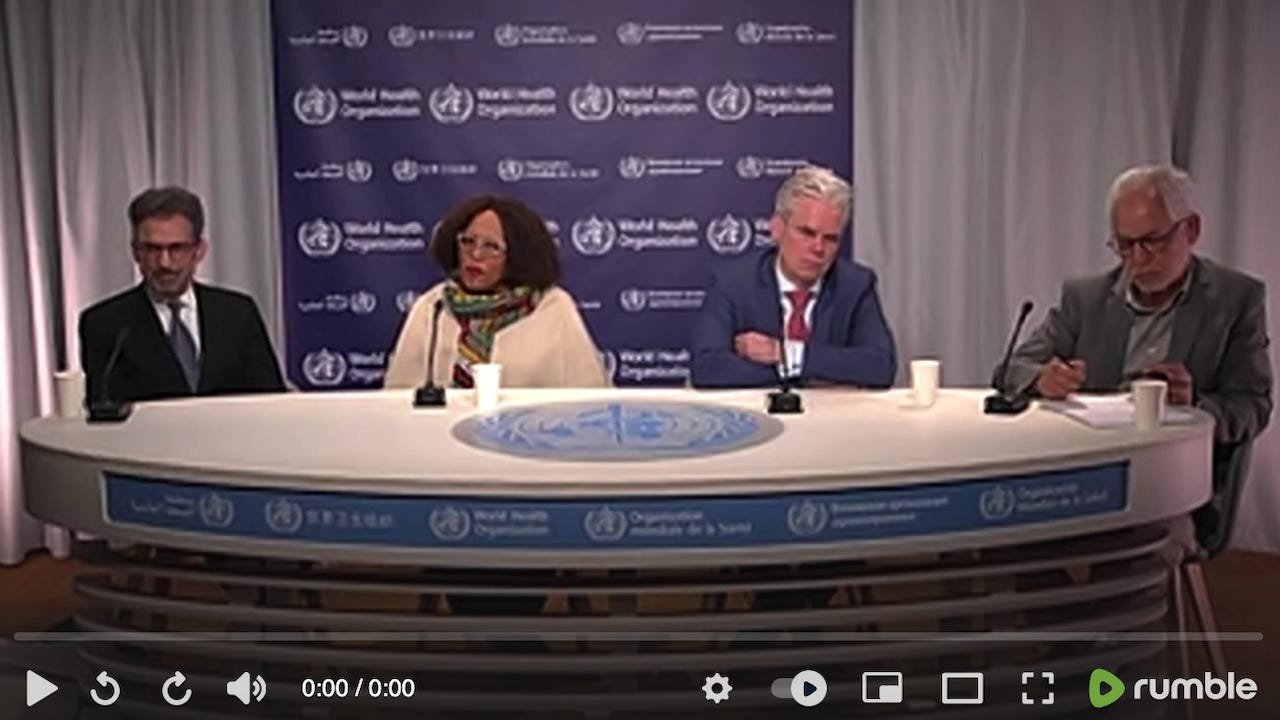Share
Leave a comment
The window of opportunity is closing.
-INB CoChair Precious Matsoso
https://rumble.com/v4t1rz3-official-press-briefing-for-the-pandemic-treaty-may-3-2024.html
https://jamesroguski.substack.com/p/red-herrings
https://jamesroguski.substack.com/p/quarantine
https://jamesroguski.substack.com/p/barking-up-the-wrong-tree
https://jamesroguski.substack.com/p/greed
Article 24. Secretariat
3.
Nothing in the WHO Pandemic Agreement shall be interpreted as providing
the WHO Secretariat, including the WHO Director-General, any authority
to direct, order, alter or otherwise prescribe the national and/or
domestic laws, as appropriate, or policies of any Party, or to mandate
or otherwise impose any requirements that Parties take specific actions,
such as ban or accept travellers, impose vaccination mandates or
therapeutic or diagnostic measures or implement lockdowns.
https://apps.who.int/gb/inb/pdf_files/inb9/A_inb9_3Rev1-en.pdf
Discussions
on the pathogen access and benefit-sharing (PABS) system were often
tense, on at least on two occasions, when the Co-chair of the Bureau of
the Intergovernmental Negotiating Body (INB) tried to shut down the
Africa Group’s proposals on the matter.
On the third day of the meeting (1st
May) , discussions began on Article 12 of the Bureau’s text on the PABS
system. Most of the discussion was moderated by the Bureau Co-chair
Roland Driece of Netherlands.
According
to sources, on two occasions, the Co-chair intervened as the Africa
Group was making proposals on the PABS system, attempting to cut short
the interventions.
Co-chair
Driece also attempted to defer discussion on Article 12 by indicating
that the rest of the day would be spent discussing other articles in the
draft Pandemic Agreement.
However,
members of the Africa Group objected to the insufficient time allocated
for this crucial aspect of the Pandemic Agreement.
Egypt
argued that Article 12 is the starting point for facilitating other
articles stating that until Article 12 is cleared, progress cannot be
achieved.
WHO’s legal office shared a white paper on Friday morning (3rd),
on how the new instruments being considered, PABS and a One Health
instrument proposed by the Bureau, will be established and how existing
and future instruments (the International Health Regulations, the
Pandemic Agreement, the PABS System and One Health Instrument (which is
strongly opposed by many countries) will interact with each other given
their different mandates, governance and financial structures. The paper
does not provide clear options to WHO member States how fragmentation
of the health emergency can be avoided.
In
the corridors, among developing countries there is significant
opposition to such an instrument. Certain developed countries have also
privately expressed concern about this new instrument. The scope and
content of such an instrument is also unclear.
The
EU said an element should be: “The benefit sharing shall be implemented
by legally binding contracts between the PABS system and private
entities”. This proposal, however, is an attempt to sneak in its
proposal on the development of the PABS system, an approach that is
flawed and has been rejected by developing countries.
Some developed countries proposed replacing “access to” with “commercial use”.
The
United States, which is not Party to either instrument, is clearly
seeking to undermine the core principles of the Convention for
Biological Diversity and its Nagoya Protocol.
https://twn.my/title2/health.info/2024/hi240505.htm
We,
the undersigned civil society organizations, are reaching out to you to
underscore our grave concerns regarding the negotiation process of the
Intergovernmental Negotiating Body (INB) for the Pandemic Agreement.
The
resumed 9 th session of the INB is the last round of negotiation prior
to the 77th World Health Assembly (WHA). The INB Bureau and the WHO
Secretariat are pushing hard for acceptance of the draft Pandemic
Agreement as proposed by the Bureau and the Secretariat with minimal
changes, at the resumed session, setting the stage for its adoption at
the 77 th WHA. While we acknowledge the importance of adopting a
Pandemic Agreement earliest possible, such an Agreement must contain
concrete measures and mechanisms that change the status quo,
operationalize equity and foster international solidarity for pandemic
prevention, preparedness and response (PPPR).
The
approach taken by the Bureau and WHO Secretariat can be seen as
coercive, effectively pressuring Member States into accepting a deeply
unbalanced legal instrument. This instrument does little more than
legitimize an inequitable regime for pandemic prevention, preparedness,
and response (PPPR).
We therefore call on you to take measures:
To
refrain from advocating or pressuring Member States to accept the draft
Pandemic Agreement as proposed by the Bureau and WHO Secretariat;
To
ensure that resumed INB9 allows for effective Member State-led
text-based negotiations i.e. to allow Member states to insert and delete
text into the proposed draft text and to continue negotiations among
Member States until they reach consensus. The role of the Bureau and the
Co-chairs should be limited to moderating the negotiations, and from
time to time suggesting text to bridge differences between Members.
However at no time should Members be negotiating with the Bureau and the
Secretariat, and neither should the Bureau and Secretariat text be
considered the default text.
There
should also be advance notice and clarity on the type, timings and
topics of the formal and informal meetings that will be held. Multiple
parallel informal or formal working groups should be avoided.
https://twn.my/announcement/20240428_Open-Letter-to-the-Director-General-of-the-World-Health-Organization_FINAL.pdf
WHO
member states finally began text-based negotiations on a new Pandemic
Agreement at WHO this week after more than two years since the process
commenced.
This
comes far too late, with just over a handful of negotiating days left
to conclude this process. As a result, the risk of a weak text emerging
out of this process is nearly certain now.
This
week, discussions on PABS began with a fundamental disagreement between
countries on whether pathogen access should be linked to
benefit-sharing. This is significant, because the recognition of this
principle is central to the tenets of the Convention on Biological
Diversity and the subsequent Nagoya Protocol on Access and Benefit-Sharing.
Developed countries including the EU, and other stakeholders have called against making such a link. (The industry has called monetizing access as a “no-go”.)
So
essentially, developed countries want a SII [Specialized International
Instrument] that promises legal certainty, but appear unwilling to agree
on the terms of benefits as articulated by developing countries.
Officials
described the PABS discussions this week as “difficult”. The UK is not
in favor of specifying a percentage of sharing real-time production with
the PABS system. (This ranges from 10% as proposed in text on the
table, with Africa Group pushing for 40%.)
A
developed country said, “A PABS system will not deliver equitable
access. We will end up interfering with free access and innovation.”
“We
are less concerned about the percentage figures. What is more important
for us is mandatory tech transfer in the context of PABS. That is the
only way you can diversify production at the height of a health
emergency”, a developing country delegate explained to us.
Without consensus on this basic principle, the details will not matter.
QUALIFIERS WORK BOTH WAYS
Many
developed and developing countries seem to agree that the proposed text
on the table is weak – not strong enough on surveillance for the
former, and not [strong] enough on equity provisions for the latter.
Both
are unhappy about the use of qualifiers to weaken the text including
terms like, “as appropriate”, “as per national circumstances”, “to the
extent” among others. But both are using them.
So,
while qualifiers are being deployed skillfully by developed countries
to weaken commitments on equity including across provisions on research
and development, production, technology transfer, PABS, supply chain;
developing countries are pushing for tempering down obligations on
surveillance and One Health with the use of qualifiers.
While
PABS could hold the key to unlock the impasse facing countries, without
consensus on principles, it could potentially bring this whole edifice
down at this stage.
“There
are text-based negotiations on some of the provisions,” a senior
official who is a part of the process said this week. On certain less
contentious provisions, countries proceeded through grading some of the
text with yellow, indicating that there has been some level of
consideration. Greening of text would indicate full consensus. So far,
we understand that no text has been greened yet.
The One Health Gauntlet
A
proposed new One Health instrument as articulated in the Bureau’s
proposal last month, is significant not only for this negotiation, but
also for its potential implications in other fora.
While
no member states had formally proposed for a separate track on One
Health, it is not immediately clear why the Bureau proposed to do so.
(This is part of a draft resolution proposed by the Bureau.)
While
this came as a surprise to many, for some countries they had factored
this in. “We knew this was coming. Now we will have to make a
determination whether we are willing to agree to One Health provisions
in return for PABS,” a developing country negotiator told us this week.
Civil
Society including Third World Network, have been of the view that
surveillance obligations will farm out commercially attractive data – a
factor, that they say, is driving the One Health agenda in the context
of the Pandemic Agreement.
“A
One Health instrument was never discussed, we cannot agree to this at
the last minute”, another developing country negotiator said.
“We
are close to a tipping point, and they should not push it further” a
developed country negotiator told us. This could likely be read as a
warning that any potential failure of the process could be directed on
the inflexible positions of the Africa Group.
Efforts
have been on to bring the Africa Group closer to the positions of
developed countries, notably the EU. We learned of informal discussions
between the EU and Africa Group in a bid to discuss key differences on
financing, PABS, One Health and technology transfer.
In
addition to the agreement itself, countries will also negotiate a
resolution on the process that will be considered by the World Health
Assembly in three weeks’ time.
“The
rate at which we are going, we will be unable to agree on even a
resolution. In my view these discussions are in a deep quagmire. What is
needed is a change of heart and mind, not text”, a developing country
negotiator told us this week.
There is no time left within existing timelines to do this well.
https://genevahealthfiles.substack.com/p/pabs-onehealth-inb-geneva-pandemic-agreement-who


The old system is crumbling, and we must build its replacement quickly.
If
you are fed up with the government, hospital, medical, pharmaceutical,
media, industrial complex and would like to help build a holistic
alternative to the WHO, then feel free to contact me directly anytime.
JamesRoguski.com
JamesRoguski.substack.com/about
JamesRoguski.substack.com/archive
310-619-3055
All content is free to all readers.
All support is deeply appreciated.
CLICK HERE TO DONATE
Share
Leave a comment











No comments:
Post a Comment